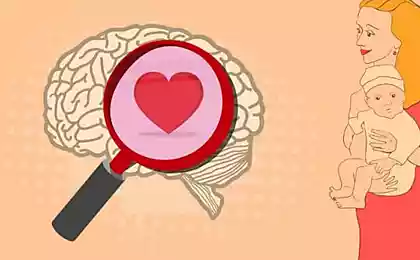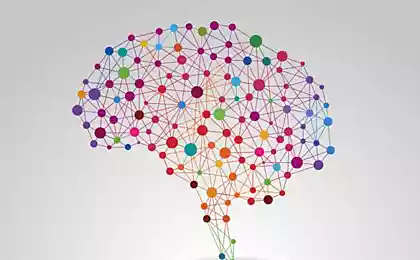553
How to develop emotional intelligence
Seventy nine million five hundred thirty eight thousand one hundred eighty five
We all, one way or another, faced a people who perfectly, at a glance, feel and understand other people. The prerequisites for this behavior are properties of temperament, hereditary factors-emotional sensitivity, good development of the right hemisphere and features of information processing. It is believed that emotional intelligence is more developed, extroverts, but in any case, the preconditions for high emotional intelligence are laid in the family. This is facilitated by good relations between parents, the harmonious upbringing of the child, instilling of skills of self-control, a sensible assessment and avoidance of hyperopic.
Thus, for the development of emotional intelligence of the child parents should avoid extremes in relationship with him. If the parents are so immersed in the care of the child, ready to read his thoughts and unspoken wishes and instantly fulfill them, the child has no need to seek to establish emotional contact, and mechanisms to do it, not formed and do not develop.
In the family the child is five years old, and he's not talking. To what only to doctors did not drive — they all say that everything is in order and must speak. Desperate family sitting at the table and see how the child eats. Ate porridge, takes the tea, took a SIP, "why is tea without sugar?". All jumped up "Yay! spoke!!! What are you used to silence?" And the child answered: "So early everything was fine..."
If the child is potentially able to establish emotional contact, deprived of the opportunity to install it because of the indifference or hostility of relatives, that he later may have problems with expression of emotions and relations with others, as he is accustomed to adjust and defend.
The boy grew up in a family where not speaking to each other. The meals actually proceeded in silence, and then, all went about their business: dad sat to the TV, mom worked on the farm, and the baby was playing on my own. After finishing school, in which he found himself as lonely as in a family, the boy went to College. By the end of the first year, he became a byword for teachers of humanitarian disciplines — history, philosophy needed to talk, to debate, and the young man did not go to the contact, not able to do it. He was lucky — the teachers got extremely concerned. They tried to stir him as he could, he the situation. In addition, he was potentially capable of communication. Efforts were not in vain, the grain fell on fertile ground, and by the end of the Institute it was not easy to know: going on contact easily and naturally, always smiling, the young man was markedly different from the closed and sullen boy who crosses the threshold of the Institute for several years before that.
As can be seen from the above example, emotional intelligence can and should develop. D. Holman and other researchers of this phenomenon believe that it is available to anyone.
One of the interesting points related to prerequisites of emotional intelligence, is androgyny – the presence of psychological features characteristic of the opposite sex. People with well-developed androgyny, in contrast, people with male and female characteristics, have greater emotional flexibility: depending on the situation they can be flexible and caring, free and strong. According to researchers, androgyny is a combination of the best typical male and female qualities in a representative of either sex.
One of the ways of development of emotional intelligence is the acting training that allows:
— to detect and relieve muscle clips, stifle freedom of the body;
— to acquaint the person with your own body, to learn to manage it;
— learn to focus on non-verbal communication and to develop them as an essential tool of artistic expression.
Follow the exercises and analyze your health.
Acting training for the development of emotional intelligence.
1. The same word can be pronounced with different intonation, practise your intonation possible. Choose a word and say it: loud — quiet; short extended; stammering – Yes; surprised, enthusiastically, thoughtfully, provocatively, mournfully, tenderly, ironically, angrily, in a tone of a responsible employee, disappointedly, triumphantly.
2. Read any text, for example, the tale "Kolobok" with the maximum volume; with machine-gun speed; whisper; at a snail's pace; as if you are terribly frozen, as if in the mouth you have a hot potato; how would it read alien; robot; a five year old girl; like you listens to all of humanity, and you this text needs to explain to him how important it is for people to seek to do good to each other, and other words you do not; like this text you speak of love, and the other the benefit of the doubt there.
Write it down on tape. Listen, check awesome for you and repeat it.
3. Like how to walk, a baby that has just started to walk; a very old man; the lioness in the cage and on the loose; ballet dancer; gorilla; hamlet, Prince of Denmark; he is sick strong sciatica; amoeba; soldiers of the Prussian army; Romeo in eager anticipation of the date. The options you can think different, the main thing is to get involved in the process, to enjoy improvisation.
4. Playing with facial expressions – smile: as lady Macbeth, like the baby — mother mother — baby, dog – owner, cat in the sun; frown – as the child who took the toy; aggrieved person; king Lear...facial Expressions — the movement of facial muscles, reflecting the internal emotional state of a person. The possession of facial expressions to everyone.
5. Sing, sing...
6. Think, think...
All these exercises allow you to relax, to be different, challenge yourself and find yourself. I mean, what if your inner essence — the Dragonfly, like no tension on the image of Flies boldly buzzing, hybrid does not work, but the quality of some of what you can borrow.
We have in previous articles talked about the need to keep a diary in the process of work. When working with the development of emotional intelligence it is also necessary to record the changes.
For the development of emotional intelligence of an adult looking for feedback from other people: friends, colleagues and the leadership. It often happens that our ideas about ourselves do not match with the assessments of the people around us. We think of ourselves as smart, educated, strong-willed people who have achieved certain success, but the authorities underestimate our abilities, time and again, avoiding the higher, and colleagues are seen as empty space. To answer the question, why is this happening and is it possible to change the situation, allows the management model of "Johari Window". But before we talk about this, do the following exercise.
Write down on a sheet of paper a number of personality characteristics: funny, adult, attentive, courageous, proud, friendly, trusting, caring, dependent, dreamy, shy, sensible, knowledgeable, idealistic, ingenious, introverted, searching, loving, dreamy, wise, reliable, assertive, tense, independent, nervous, cautious, witty, brave, helpful, helping, understanding, adaptable, joyful, relaxed, rational, modest, weak, complex, organized, sympathetic, calm, spontaneous, talented, quiet, confident, clever, stubborn, brave, sensitive, extroverted, energetic
Describe yourself with adjectives from the list, and then offered to do the same to your friends and colleagues.
Next, take a sheet of paper, divide it vertically and horizontally in half. Will four zones.
In the upper left (arena) write the words that are in your own list, and in public. In the left bottom (Front) - words that exist only in their own list. In the upper right (Blind spot) — words that exist only in the public list. In the lower right (Unknown) — words not in any list. Many of the definitions included in the "Blind spot"? The more, the more you will need to work on developing your emotional intelligence.
Consider each of the zones:
"Arena" is an open area where there is information about the person is known to both himself and others.
— "Facade" — this is a hidden area where there is information about the man known to himself, but for one reason or another, hidden from others;
— "Blind spot" — here you can find information about the man known to others but unknown to him (the opinion of others);
— "Unknown" — this area speaks for itself, this includes information which is unknown by man or his environment, and it manifests itself only in extreme cases.
To enhance their emotional contacts with other people to maximize the open area, due to the movement of information from the hidden and blind areas. She goes into the open area at the moment when we open up to people. For example, you have been studying Italian, what one of my colleagues knows. At some point it appears that the supervisor received an invitation to the exhibition in Italy and was rushed off there, taking with him the first interpreter, and if colleagues know about your language proficiency, it is likely the head would fly you.
As a rule, people believe that it is necessary to hide negative information about themselves, but people with high emotional intelligence accepts himself for all his flaws, and is not concerned about the fact that they are known to others, because he understands: people without flaws do not exist, and its advantages outweigh the negatives.
Information from the "blind" area will be open at the time we requested and received feedback from other people, or she comes without asking, in the process of communication.
Ask yourself the following questions:
— how do you determine the reaction of other people on your behavior?
— what is your reaction if in response to your behavior the other person has behaved unexpectedly or weird?
— are you tolerant of criticism?
Openly giving the answers to these questions, you will be able to determine what you should work to use feedback for self-reflection.
Feedback can and should ask only neutral people who are not emotionally involved in the relationship with you. Loving people will try to mitigate, to sugarcoat the experience, and wish you may be punished – hit complete than can cause you serious psychological trauma. Don't forget: feedback provides information about how the world perceives you, and not who you actually are. Feedback is a gift. Regardless of whether it is positive or not, she should be thanked because it gives serious food for thought and self-improvement. published
Source: www.matrony.ru/emocionalnyj-intellekt-chast-vtoraya/
We all, one way or another, faced a people who perfectly, at a glance, feel and understand other people. The prerequisites for this behavior are properties of temperament, hereditary factors-emotional sensitivity, good development of the right hemisphere and features of information processing. It is believed that emotional intelligence is more developed, extroverts, but in any case, the preconditions for high emotional intelligence are laid in the family. This is facilitated by good relations between parents, the harmonious upbringing of the child, instilling of skills of self-control, a sensible assessment and avoidance of hyperopic.
Thus, for the development of emotional intelligence of the child parents should avoid extremes in relationship with him. If the parents are so immersed in the care of the child, ready to read his thoughts and unspoken wishes and instantly fulfill them, the child has no need to seek to establish emotional contact, and mechanisms to do it, not formed and do not develop.
In the family the child is five years old, and he's not talking. To what only to doctors did not drive — they all say that everything is in order and must speak. Desperate family sitting at the table and see how the child eats. Ate porridge, takes the tea, took a SIP, "why is tea without sugar?". All jumped up "Yay! spoke!!! What are you used to silence?" And the child answered: "So early everything was fine..."
If the child is potentially able to establish emotional contact, deprived of the opportunity to install it because of the indifference or hostility of relatives, that he later may have problems with expression of emotions and relations with others, as he is accustomed to adjust and defend.
The boy grew up in a family where not speaking to each other. The meals actually proceeded in silence, and then, all went about their business: dad sat to the TV, mom worked on the farm, and the baby was playing on my own. After finishing school, in which he found himself as lonely as in a family, the boy went to College. By the end of the first year, he became a byword for teachers of humanitarian disciplines — history, philosophy needed to talk, to debate, and the young man did not go to the contact, not able to do it. He was lucky — the teachers got extremely concerned. They tried to stir him as he could, he the situation. In addition, he was potentially capable of communication. Efforts were not in vain, the grain fell on fertile ground, and by the end of the Institute it was not easy to know: going on contact easily and naturally, always smiling, the young man was markedly different from the closed and sullen boy who crosses the threshold of the Institute for several years before that.
As can be seen from the above example, emotional intelligence can and should develop. D. Holman and other researchers of this phenomenon believe that it is available to anyone.
One of the interesting points related to prerequisites of emotional intelligence, is androgyny – the presence of psychological features characteristic of the opposite sex. People with well-developed androgyny, in contrast, people with male and female characteristics, have greater emotional flexibility: depending on the situation they can be flexible and caring, free and strong. According to researchers, androgyny is a combination of the best typical male and female qualities in a representative of either sex.
One of the ways of development of emotional intelligence is the acting training that allows:
— to detect and relieve muscle clips, stifle freedom of the body;
— to acquaint the person with your own body, to learn to manage it;
— learn to focus on non-verbal communication and to develop them as an essential tool of artistic expression.
Follow the exercises and analyze your health.
Acting training for the development of emotional intelligence.
1. The same word can be pronounced with different intonation, practise your intonation possible. Choose a word and say it: loud — quiet; short extended; stammering – Yes; surprised, enthusiastically, thoughtfully, provocatively, mournfully, tenderly, ironically, angrily, in a tone of a responsible employee, disappointedly, triumphantly.
2. Read any text, for example, the tale "Kolobok" with the maximum volume; with machine-gun speed; whisper; at a snail's pace; as if you are terribly frozen, as if in the mouth you have a hot potato; how would it read alien; robot; a five year old girl; like you listens to all of humanity, and you this text needs to explain to him how important it is for people to seek to do good to each other, and other words you do not; like this text you speak of love, and the other the benefit of the doubt there.
Write it down on tape. Listen, check awesome for you and repeat it.
3. Like how to walk, a baby that has just started to walk; a very old man; the lioness in the cage and on the loose; ballet dancer; gorilla; hamlet, Prince of Denmark; he is sick strong sciatica; amoeba; soldiers of the Prussian army; Romeo in eager anticipation of the date. The options you can think different, the main thing is to get involved in the process, to enjoy improvisation.
4. Playing with facial expressions – smile: as lady Macbeth, like the baby — mother mother — baby, dog – owner, cat in the sun; frown – as the child who took the toy; aggrieved person; king Lear...facial Expressions — the movement of facial muscles, reflecting the internal emotional state of a person. The possession of facial expressions to everyone.
5. Sing, sing...
6. Think, think...
All these exercises allow you to relax, to be different, challenge yourself and find yourself. I mean, what if your inner essence — the Dragonfly, like no tension on the image of Flies boldly buzzing, hybrid does not work, but the quality of some of what you can borrow.
We have in previous articles talked about the need to keep a diary in the process of work. When working with the development of emotional intelligence it is also necessary to record the changes.
For the development of emotional intelligence of an adult looking for feedback from other people: friends, colleagues and the leadership. It often happens that our ideas about ourselves do not match with the assessments of the people around us. We think of ourselves as smart, educated, strong-willed people who have achieved certain success, but the authorities underestimate our abilities, time and again, avoiding the higher, and colleagues are seen as empty space. To answer the question, why is this happening and is it possible to change the situation, allows the management model of "Johari Window". But before we talk about this, do the following exercise.
Write down on a sheet of paper a number of personality characteristics: funny, adult, attentive, courageous, proud, friendly, trusting, caring, dependent, dreamy, shy, sensible, knowledgeable, idealistic, ingenious, introverted, searching, loving, dreamy, wise, reliable, assertive, tense, independent, nervous, cautious, witty, brave, helpful, helping, understanding, adaptable, joyful, relaxed, rational, modest, weak, complex, organized, sympathetic, calm, spontaneous, talented, quiet, confident, clever, stubborn, brave, sensitive, extroverted, energetic
Describe yourself with adjectives from the list, and then offered to do the same to your friends and colleagues.
Next, take a sheet of paper, divide it vertically and horizontally in half. Will four zones.
In the upper left (arena) write the words that are in your own list, and in public. In the left bottom (Front) - words that exist only in their own list. In the upper right (Blind spot) — words that exist only in the public list. In the lower right (Unknown) — words not in any list. Many of the definitions included in the "Blind spot"? The more, the more you will need to work on developing your emotional intelligence.
Consider each of the zones:
"Arena" is an open area where there is information about the person is known to both himself and others.
— "Facade" — this is a hidden area where there is information about the man known to himself, but for one reason or another, hidden from others;
— "Blind spot" — here you can find information about the man known to others but unknown to him (the opinion of others);
— "Unknown" — this area speaks for itself, this includes information which is unknown by man or his environment, and it manifests itself only in extreme cases.
To enhance their emotional contacts with other people to maximize the open area, due to the movement of information from the hidden and blind areas. She goes into the open area at the moment when we open up to people. For example, you have been studying Italian, what one of my colleagues knows. At some point it appears that the supervisor received an invitation to the exhibition in Italy and was rushed off there, taking with him the first interpreter, and if colleagues know about your language proficiency, it is likely the head would fly you.
As a rule, people believe that it is necessary to hide negative information about themselves, but people with high emotional intelligence accepts himself for all his flaws, and is not concerned about the fact that they are known to others, because he understands: people without flaws do not exist, and its advantages outweigh the negatives.
Information from the "blind" area will be open at the time we requested and received feedback from other people, or she comes without asking, in the process of communication.
Ask yourself the following questions:
— how do you determine the reaction of other people on your behavior?
— what is your reaction if in response to your behavior the other person has behaved unexpectedly or weird?
— are you tolerant of criticism?
Openly giving the answers to these questions, you will be able to determine what you should work to use feedback for self-reflection.
Feedback can and should ask only neutral people who are not emotionally involved in the relationship with you. Loving people will try to mitigate, to sugarcoat the experience, and wish you may be punished – hit complete than can cause you serious psychological trauma. Don't forget: feedback provides information about how the world perceives you, and not who you actually are. Feedback is a gift. Regardless of whether it is positive or not, she should be thanked because it gives serious food for thought and self-improvement. published
Source: www.matrony.ru/emocionalnyj-intellekt-chast-vtoraya/























